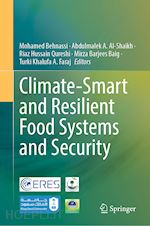
Questo prodotto usufruisce delle SPEDIZIONI GRATIS
selezionando l'opzione Corriere Veloce in fase di ordine.
Pagabile anche con Carta della cultura giovani e del merito, 18App Bonus Cultura e Carta del Docente
This contributed book, as a part of a series of CERES publications, contributes to the scientific debate about the interlinkages between climate change, environment, and food systems. It highlights the opportunities to accelerate the transformation of such systems within the perspective of sustainable, inclusive, and climate-smart practices. Most chapters are based on empirical research particularly done in vulnerable and resource-constrained countries from the Global South (such as India, Kenya, Pakistan, South Asia, Sri Lanka, and Vietnam) and provide policy-oriented inputs and recommendations to guide change processes at multiple scales. This project has implications for research, innovation, and policy design.
Climate Smart and Resilient Food Systems and Security An Introduction.- Bundling Climate Smart Agriculture Systems in Morocco.- Climate Change Challenges and its Preparedness towards Agriculture using Climate Smart Agriculture in Potohar Plateau of Pakistan.- Contribution of Renewable Energy Resources for Food Production and Food Security.
Dr. Mohamed Behnassi
Dr. Behnassi is currently Senior Environmentalist Expert at the Economic, Social and
Environmental Council (CESE), Rabat, Morocco. From December 2004 to June 2022,
he was Professor at the College of Law, Economics, and Social Sciences, Ibn Zohr
University of Agadir. He holds a Ph.D. in International Environmental Law and
Governance (Hassan II University of Casablanca, 2003) and a Diploma in
International Environmental Law and Diplomacy (University of Eastern Finland and
UNEP, 2015). He is currently Founding Director of the Center for Environment, Human
Security and Governance (CERES)—Former North-South Center for Social Sciences
(NRCS). From 2015 to 2018, he was Director of the Research Laboratory for
Territorial Governance, Human Security and Sustainability (LAGOS). In recent years,
he was appointed as Expert Evaluator by the National Center for Scientific and
Technical Research (CNRST/Morocco), Scoping Expert and Review Editor by the
Intergovernmental Science-Policy Platform on Biodiversity and Ecosystem Services
(IPBES), and Lead Author and Coordinating Lead Author by the
Mediterranean Experts on Climate and Environmental Change (MEDECC). His main
research and expertise area includes international law and politics of environment
and human security. In these areas, he published considerable number of scientific
papers and book chapters in addition to 20 books, including recent ones on: Food
Security and Climate-Climate Smart Food Systems - Building Resilience for the Global
South (Springer, 2022); The Climate-Conflict-Migration Nexus from a Human
Security Perspective (Springer, 2022); and Social-Ecological Systems in the Era of
Risks and Insecurity - Pathways to Viability and Resilience (Springer, 2021).He
serves as Reviewer for many global publishers (such as Routledge and Springer) and
scientific journals with high impact factor. He has organized many international
conferences covering the above research areas, managed many research and
expertise projects, and is regularly requested to provide scientific expertise nationally
and internationally. Other professional activities include social compliance auditing
and consultancy by monitoring human rights at work and the sustainability of the
global supply chain.
Dr. Abdumalek A. Al-Shaikh
Dr. Al-Shaikh is Director of the Prince Sultan Institute for Environmental, Water,
and Desert Research at the King Saud University (KSU) in Riyadh, Saudi Arabia. He
earned his Ph.D. in Arid Land Studies from the University of Arizona, USA, in 1983.
He also serves as General Secretary of the Prince Sultan bin Abdulaziz International
Prize for Water (PSIPW). The prize is awarded bi-annually at the United Nations
Headquarters. Being Director and Research Chair, he oversees the Research
Programs at the Institute. He is Team Leader of many research projects concerning
the environment, desertification, climate change, and water harvesting in Saudi
Arabia including the King Fahd Project for Water Harvesting and Storage in Saudi
Arabia, Prince Sultan Project for Villages and Hamlets Rehabilitation in Saudi
Arabia, the Space Images Atlas of Saudi Arabia, and the Environmental Atlas of
Saudi Arabia. Being Chairman of the international conferences on water resources
and arid environments, he successfully organized them at the King Saud University.
He has brought world fame water scientists to Saudi Arabia and published nine
proceedings of organized international conferences. He has published extensively in
journals of international repute.
Dr. Mirza Barjees Baig
Dr. Baig is Professor at the Prince Sultan Institute for Environmental, Water, and
Desert Research, King Saud University, Saudi Arabia. He earned his M.S. degree in
International Agricultural Extension in 1992 from the Utah State University, Logan,
Utah, USA, and was placed on the ‘Roll of Honor’. He completed his Ph.D. in
Extension for Natural Resource Management from the University of Idaho, USA, and
was honored with the ‘1995 Outstanding Graduate Student Award’. He has
published extensively on the issues associated with natural resources in national
and international journals. He has also made oral presentations about agriculture
and natural resources and the role of extension education at various international
conferences. Food waste, water management, degradationof natural resources,
deteriorating environment, and their relationship with society/community are his
areas of interest. He has attempted to develop strategies to











Il sito utilizza cookie ed altri strumenti di tracciamento che raccolgono informazioni dal dispositivo dell’utente. Oltre ai cookie tecnici ed analitici aggregati, strettamente necessari per il funzionamento di questo sito web, previo consenso dell’utente possono essere installati cookie di profilazione e marketing e cookie dei social media. Cliccando su “Accetto tutti i cookie” saranno attivate tutte le categorie di cookie. Per accettare solo deterninate categorie di cookie, cliccare invece su “Impostazioni cookie”. Chiudendo il banner o continuando a navigare saranno installati solo cookie tecnici. Per maggiori dettagli, consultare la Cookie Policy.